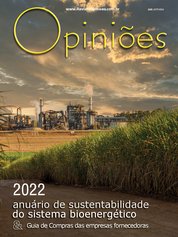Luiz Gustavo Junqueira Figueiredo
Diretor Comercial da Usina Alta Mogiana
AsAA22
Desafios e oportunidades para uma agenda global sustentável
Estamos passando por momentos de muita apreensão climática e energética em todo o mundo. Não apenas a pandemia de Covid fez as pessoas refletirem mais sobre a sua própria sustentabilidade, como também o recente conflito entre a Rússia e Ucrânia escancarou os enormes desafios de fontes confiáveis de energia que muitos países enfrentam. A ironia da guerra, em que os consumidores foram forçados a diminuir o consumo de eletricidade, enquanto suas contas de luz iam para a estratosfera, fez com que um cenário cor-de-rosa fosse simplesmente estraçalhado.
Para complicar o cenário, as recentes interrupções das cadeias globais de fornecimento de peças e componentes trouxeram à tona questionamentos sobre a oferta das matérias-primas das baterias que vão ser utilizadas nesses automóveis, deixando claro que os custos decrescentes das baterias observado nos últimos anos está em xeque.
Adicionalmente, as empresas de petróleo estão sofrendo uma pressão enorme de seus acionistas, causando uma diminuição relevante em investimentos em novos campos de gás e óleo. Fica evidente, portanto, que estamos diante de um grande dilema: como diminuirmos a dependência dos combustíveis fósseis, mas, ao mesmo tempo, assegurar que os consumidores e os países sofrerão menos com o risco de desabastecimento e de explosão de preços?
A resposta a essa questão passa, inevitavelmente, pelo etanol. Não só o etanol está encontrando um espaço cada vez maior como oxigenante da gasolina (o exemplo mais recente do aumento das metas de mistura na Índia é emblemático), como também são alvissareiras as perspectivas do motor a célula de combustível movido a etanol: aí sim um motor elétrico com uma fonte renovável, limpa e abundante. E o mais importante: com uma rede de distribuição já estabelecida e com a estrutura de tanques de armazenamento que as empresas de derivados de petróleo já construíram no passado. Não custa lembrar que a energia elétrica possui inúmeras restrições para o seu armazenamento, causando o risco de desabastecimento e até de um colapso econômico, no caso de uma restrição aguda de oferta. O Brasil sabe bem como o risco de apagões de energia elétrica podem se transformar em um enorme pesadelo econômico e social.
O desafio de se encontrar substitutos limpos e confiáveis ao petróleo e aos seus derivados é tão gigantesco e complexo que nenhuma fonte limpa e renovável deve ser descartada. Como fazer, então, essa transição de forma segura? Uma das respostas está no crescimento dos mercados de crédito de carbono ao redor do mundo. Políticas públicas que direcionem investimentos e consumo para fontes de energia limpas devem, obrigatoriamente, contar com programas desse tipo. Aqui, no Brasil, podemos nos orgulhar por já termos feito a nossa lição de casa, o RenovaBio. Diversos especialistas, técnicos governamentais, fabricantes de automóveis, distribuidoras e produtores de combustíveis renováveis se juntaram para criar o que, talvez, seja, hoje, um dos melhores programas desse tipo no mundo. A geração e a comercialização de créditos de carbono (os CBIOs) obedecem a uma lógica de mercado, com regras previsíveis e sem custo para os cofres públicos.
Mesmo um programa tão robusto como esse, contudo, não está imune a falhas e a aperfeiçoamentos. Nesse sentido, o Ministério de Minas e Energia do Brasil tem procurado aprimorar o correto funcionamento desse mercado nos últimos meses. É normal que os agentes da cadeia de combustíveis, produtores, governo e consumidores encontrem pontos em comum para serem debatidos e aperfeiçoados. O que se espera, no caso, é que qualquer mudança relevante em relação a regras do RenovaBio sejam discutidas amplamente com todos os players e com a sociedade, a fim de não descaracterizar o programa, a ponto de os produtores e compradores não acreditarem no seu correto funcionamento. Além disso, é absolutamente fundamental que todos entendam a natureza intrínseca do seu funcionamento: a de que os preços dos CBIOs vão oscilar. Em qualquer mercado livre, são as cotações das mercadorias que enviam sinais aos produtores e consumidores sobre a necessidade de se aumentar ou reduzir a oferta de qualquer produto.
Precisamos que todos os agentes envolvidos no programa entendam que a volatilidade de preços não apenas é esperada, como também necessária para corrigir faltas e excessos de produto no futuro. Intervenções com o intuito de se evitar a volatilidade de curto prazo podem parecer eficazes em um primeiro momento, mas, muitas vezes, não servem para ajustar a oferta futura, ao tirar a confiança dos agentes de mercado. Na prática, troca-se uma menor volatilidade no presente por uma distorção maior ainda no futuro, à medida que a solução do problema não seja dada de forma transparente e ágil.
O Brasil está muito bem posicionado para surfar a onda da sustentabilidade global. Temos o clima adequado, terras abundantes, vontade em empreender; somos um país pacífico e democrático. A onda verde pode levar nosso país a um novo patamar de desenvolvimento, gerando crescimento, renda e empregos. Basta que as engrenagens de mercado e as corretas políticas públicas funcionem em sintonia, em benefício da sociedade.




